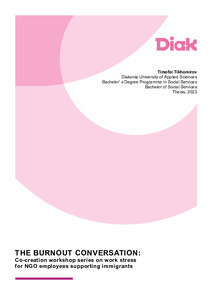The burnout conversation : co-creation workshop series on work stress for NGO employees supporting immigrants
Tikhomirov, Timofei (2023)
Tikhomirov, Timofei
2023
Julkaisun pysyvä osoite on
https://urn.fi/URN:NBN:fi:amk-2023112030364
https://urn.fi/URN:NBN:fi:amk-2023112030364
Tiivistelmä
This thesis examines the development and execution of "The Burnout Conversation", a series of two workshops rooted in co-creation and design thinking frameworks. The workshops were designed to promote open discussion and facilitate collaboration on burnout prevention strategies among NGO employees working with immigrants. The need for this development project was determined through academic literature, previous surveys done in Finland, as well as dialogues with professionals in the field. The project was conducted in collaboration with Moniheli, a Finnish nationwide multicultural network.
The discussions that took place during workshops emphasized the complex and multilevel nature of burnout in the social sector. The factors affecting well-being and suggested solutions highlight the collective responsibility in tackling burnout. In the context of this project, the participants extensively discussed the role of NGOs in fostering the well-being of their employees. The key outputs of this project included a digital document detailing the workshop discussions, workshop programs and materials, as well as recommendations for future co-creative initiatives addressing burnout in social services.
As demonstrated by the thesis, there is an interest and a need in the multicultural social welfare sector for open discussion and collaborative problem-solving on the topic of burnout. The insightful observations and ideas from the workshop participants showed the value and potential of initiatives rooted in collaborative creation. Future projects utilizing the framework of co-creation could offer innovative pathways to address the pervasive issue of burnout in the social sector.
The discussions that took place during workshops emphasized the complex and multilevel nature of burnout in the social sector. The factors affecting well-being and suggested solutions highlight the collective responsibility in tackling burnout. In the context of this project, the participants extensively discussed the role of NGOs in fostering the well-being of their employees. The key outputs of this project included a digital document detailing the workshop discussions, workshop programs and materials, as well as recommendations for future co-creative initiatives addressing burnout in social services.
As demonstrated by the thesis, there is an interest and a need in the multicultural social welfare sector for open discussion and collaborative problem-solving on the topic of burnout. The insightful observations and ideas from the workshop participants showed the value and potential of initiatives rooted in collaborative creation. Future projects utilizing the framework of co-creation could offer innovative pathways to address the pervasive issue of burnout in the social sector.
